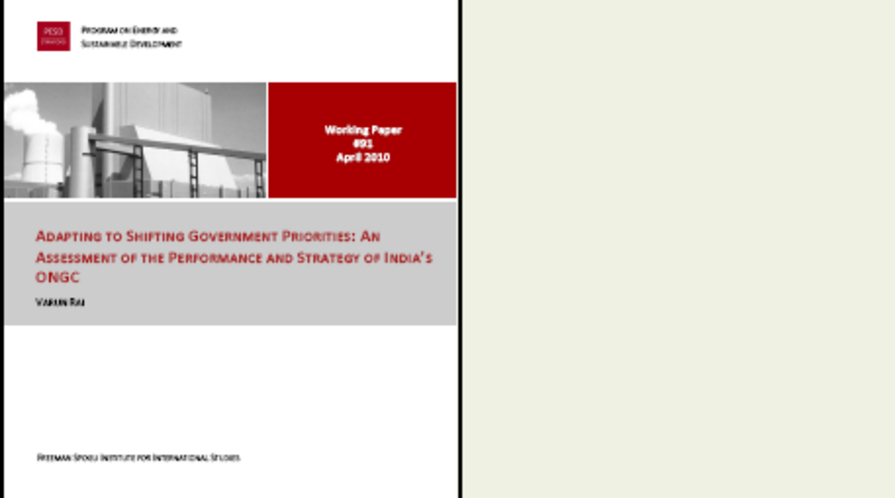Executive summary:
Statoil was founded in 1972 as the national oil company (NOC) of Norway. Along with Brazil's Petrobras, Statoil today is a leader in several technological areas including operations in deep water. With its arm's length relationship to the Norwegian government and partially-private ownership, it is generally considered to be among the state-controlled oil companies most similar to an international oil company in governance, business strategy, and performance.
Statoil's development and performance have been intimately connected to its relationship with the Norwegian government over the years. The "Norwegian Model" of distinguishing Statoil's commercial responsibilities in hydrocarbons from regulatory and policy functions granted to other government bodies has inspired admiration and imitation as the canonical model of good bureaucratic design for a hydrocarbons sector.
However, the reality is that Norway's comparative success in hydrocarbons development, and that of Statoil, has been about much more than a formula for bureaucratic organization. Belying the notion of a pristine "Norwegian Model" that unfolded inexorably from a well-designed template, the actual development of Norway's petroleum sector at times was, and often still is, a messy affair rife with conflict and uncertainty. But Norway had the advantage of entering its oil era with a mature, open democracy as well as bureaucratic institutions with experience regulating other natural resource industries. Thus far, the diverse political and regulatory institutions governing the petroleum sector-and governing the NOC-have collectively proven robust enough to handle the strains of petroleum development and correct the worst imbalances that have arisen.
Mark Thurber and Benedicte Tangen Istad make the following six principal observations from their research.
First, Norway's policy orientation from the start was focused on maintaining control over the oil sector, as opposed to simply maximizing revenue. As a result, the country was more concerned with understanding and mitigating the possible negative ramifications of oil wealth than with any special advantage that could be gained from it.
Second, the principal means through which Norway was able to exert control over domestic petroleum activities was a skillful bureaucracy operating within a mature and open political system. Civil servants gained knowledge of petroleum to regulate the sector through systematic efforts to build up their own independent competence, enabling them to productively steer the political discourse on petroleum management after the first commercial oil discovery was made. Robust contestation between socialist and conservative political parties also helped contribute to a system of oil administration that supported competition (including between multiple Norwegian oil companies as well as international operators) and was able to evolve new checks and balances as needed.
Third, Statoil did play an important role in contributing to the development of Norwegian industry and technological capability, in large part because it had the freedom to take a long-term approach to technology development. With a strong engineering orientation and few consequences for failure as a fully state-backed company, Statoil developed a culture valuing innovation over development of a lean, commercially-oriented organization. These priorities may not have always contributed to maximization of government revenues in the short run-costs came to be perceived as high in Norway (for various reasons not all related to Statoil) and Statoil was on occasion responsible for significant overruns. However, the focus on innovation contributed to significant technological breakthroughs and helped spur the development of a high-value-added domestic industry in oil services.
Fourth, the formal relationship between Statoil and the government has become more arm's-length as Norway's resources and oil expertise have matured. Under its first CEO, experienced Labour politician Arve Johnsen, Statoil aggressively flexed its political muscles to gain special advantages in licensing and access to acreage. As domestic resources began to mature, Statoil's leadership (starting with Harald Norvik in 1988, and continuing through the tenures of subsequent CEOs Olav Fjell and Helge Lund) focused more on forging an independent corporate identity and governance structure that would allow the company to compete effectively abroad.
Fifth, notwithstanding changes in their formal relationship, it has remained impossible to sever the close ties between the Norwegian state and a company with the domestic significance of Statoil. These residual ties can manifest in various ways, including: 1) the effect on policy decisions of direct personal connections between Statoil leaders and politicians; 2) persistent "Norway-centric" influences on Statoil's strategy even in the larger context of efforts to internationalize; and 3) public pressure from politicians who continue to see themselves as Statoil's masters. Such pressures can affect large strategic companies, public or private, in any country, but their effect is magnified by Norway's small size and Statoil's importance within it as the largest petroleum developer.
Sixth, Statoil's experience thus far casts doubt upon the conventional wisdom that NOC-NOC connections provide material benefit in opening resource access around the world. To the extent that such linkages are important, Statoil would seem to be among the best-positioned to benefit from them as both a highly competent producer and a company that might be sympathetic to the needs of resource-rich countries. However, there are few instances so far where Statoil's status as an NOC has been an obviously decisive factor in unlocking resources that would otherwise be off-limits.


